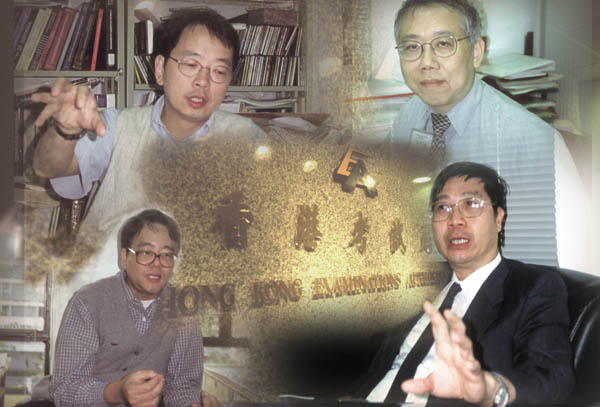 Online
Edition
Online
Edition | From
the editor Letters to the editor Milestone Answerman Periscope Campus Life Social Issues People Photo Features Education Channel Culture & Leisure Science |
| Last
Issue Archive |
| About
Varsity Advertise Media Links CUHK homepage JLM homepage |
Also
in Periscope
Forsaken
students
Related Links
Department
of Applied Social Studies of CityU
Department of Social Work of CUHK
Hong Kong Examination Authority
![]()
Exams
Educationalists seek reform
By James Chen & Eva Ling
|
Photos by James
Chen & Eva Ling |
Every year over 20,000 students score “zero” in the Hong Kong Certificate of Education Examination (HKCEE).
Dr.
Tse Wing Ling is an associate professor in the Department of Applied Social
Studies at the City University of Hong Kong.
Dr.
Tse said students who have failed examinations are regarded as “losers”.
“The
public holds a very high standard; they like to use absolute criteria to
measure a person’s success,” said he.
“Also,
they tend to focus on academic qualifications only.”
Prof.
Daniel Shek is a professor in the Department of Social Work at The Chinese
University of Hong Kong.
He
is also a member of the government’s Youth Commission.
Apart
from suicides, Prof. Shek said that examination failure leads to other teenage
problems.
“Most
teenage drug addicts are school dropouts,” he said.
Most
juvenile delinquents have poor performance in schools.
“As
they fail academically, they want to gain some sense of achievement in other
ways,” said Prof. Shek.
Academic
failures lead to low self-esteem and even stuctural problems in Hong Kong
society.
Prof.
Shek said, “Nowadays, academic qualifications affect wage levels.”
A
high unemployment rate is another consequence of the examination system.
Prof.
Shek said that youth unemployment will be a major issue in the coming 10 years.
Students
who cannot further their studies mostly decide to join the labour force.
However,
getting a job is never easy for them.
A
stagnant economy and low academic qualifications are main reasons for their
unemployment.
Dr.
Chung Yue-Ping is the dean of the
Facult of Education at The Chinese
University of Hong Kong.
Said
Dr. Chung: “The whole education system is exam-oriented rather than
curriculum and learning-oriented.
“Even
the cultural and value systems of the whole public have been distorted. The
focus is on examinations.”
Said
Prof. Shek: “Assessments spread over the forms of take-home assignments,
projects and quizzes instead of one-off exams produce less harmful effects on
students.”
Both Dr. Chung and Prof. Shek prefer the Scholastic Aptitude Test in the
U.S.
In
response to undesirable results brought on by the education system, some other
scholars have different opinions.
Mr.
Cheung Kwong Yuen is the head of Subjects Division at the Hong Kong Examination
Authority.
“The
examination tests basic abilities such as analysing and organising information
from different sources.
“If
someone fails the examination, it just means that he or she is under the
standard level,” said Mr. Cheung.
“As
an international city, we have more chances to access and study examination
systems in different countries and the mainland.”
Hong
Kong is a member of the International Association for Educational Assessment.
The
association holds a meeting every year to improve the education systems in
their member countries.
Hong
Kong will be the host for the 2002 meeting.
“We
also asked British experts on examinations to assist us on the content of
examinations. Examination questions will be sent to them,” said Mr. Cheung.
“According
to the policy of the Education and Manpower Bureau, we will add a new idea
called Primary Knowledge Elements of Courses to
the system of examinations for the HKCEE.”
According
to Mr. Cheung, during the examination, a certain percent of the content will be
based on the primary knowledge
elements.
He
said this would give students a clear idea of the content of the courses.
But
some of the reforms are not welcomed by experts, like the merger of the HKCEE
and the Hong Kong Advanced Level Examination.
According
to Prof. Chun Wing Kwong of Department of Education at The Chinese Univeristy
of Hong Kong, the function of the Advanced Level Examination is to pick out
those suitable for tertiary education while the function of the HKCEE is to
qualify for the labour force.
“The
characteristics and functions of these two examinations are different, so they
should not be merged together,” he said.
Chief
Executive Tung Chee-hwa called for more tertiary places. But this has been
criticised by experts, too.
“As
mentioned by the chief executive, if
another 60 percent gain access to university education, there must be at least
twice as many students in Form 6 as we assume that every one can enter the
university,” said Prof. Chun.
Dr.
Tse of City University said that the government is too eager to engage in
educational reform.
“These
reforms are not being weighed thoroughly,” said Dr. Tse.
He
said the government should provide more reentry paths like community colleges.
“Students
should be given chances to develop talents other than academic ones,” he
said. ![]()
Comparison
of university admission procedures in different countries
Canada
Average
academic performance and provincial examinations are generally taken into
account. Some universities like the McGill University in Montreal also
look at students’ extra-curricular activities and recommendation
letters.
Hong
Kong
Generally,
HKALE and HKCEE results are considered. Some faculties require interviews
of students.
Singapore
Each
university has its own system of student selection. In general,
students’ Advanced Level and O-level results, extra-curricular
activities, and average academic performance are taken into account. Some
faculties require interviews.
United
Kingdom
Students
hand in their own packages of data to the Universities and Colleges
Admissions Service. The packages include average academic results,
Advanced Level and O-Level results, extra-curricular activities,
recommendation letters and work experience. Some universities require
interviews.
United
States
Each
university has a different system. Students generally are assessed on the
basis of Scholastic Aptitude Test (SAT) results, average academic
performance, teachers’ recommendation letters, extra-curricular
activities and work experience. Interviews may be necessary.
